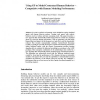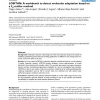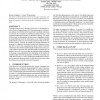198 search results - page 36 / 40 » Using Genetic Programming for Turing Machine Induction |
122
click to vote
GECCO
2004
Springer
15 years 7 months ago
2004
Springer
To create a realistic environment, some simulations require simulated agents with human behavior pattern. Creating such agents with realistic behavior can be a tedious and time con...
115
click to vote
ECML
2005
Springer
15 years 7 months ago
2005
Springer
Abstract. Learning from multi-relational domains has gained increasing attention over the past few years. Inductive logic programming (ILP) systems, which often rely on hill-climbi...
119
Voted
BMCBI
2008
15 years 2 months ago
2008
Background: Testing for selection is becoming one of the most important steps in the analysis of multilocus population genetics data sets. Existing applications are difficult to u...
109
Voted
GECCO
2005
Springer
15 years 7 months ago
2005
Springer
Code bloat, the excessive increase of code size, is an important issue in Genetic Programming (GP). This paper proposes a theoretical analysis of code bloat in the framework of sy...
100
click to vote
CCIA
2005
Springer
15 years 7 months ago
2005
Springer
One of the main keys in case-based reasoning system is the retrieval phase, where the most similar cases are retrieved by means of a similarity function. According to the problem, ...



